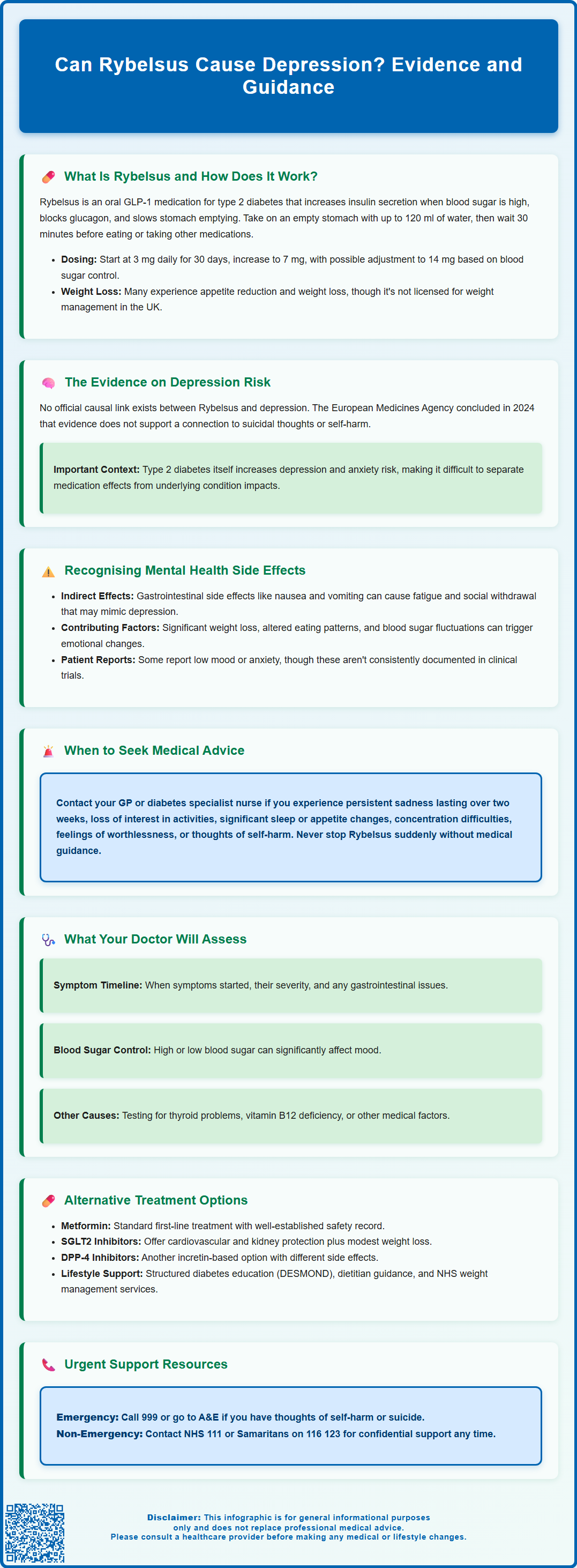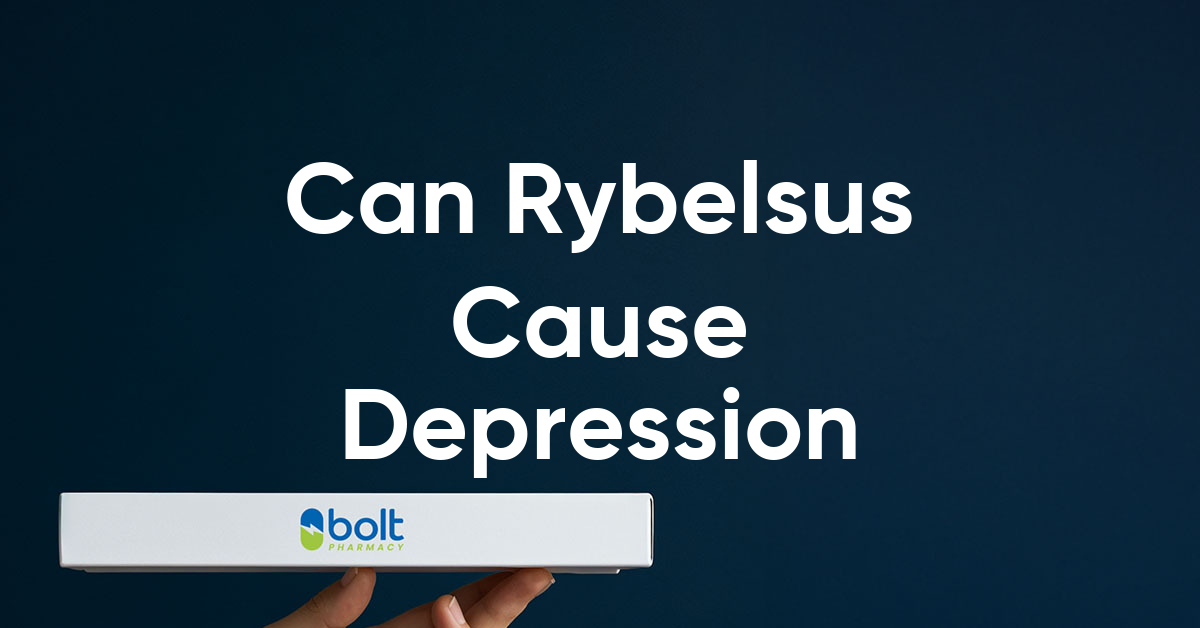Rybelsus (semaglutide) is an oral GLP-1 receptor agonist licensed in the UK for treating type 2 diabetes mellitus in adults. Whilst it effectively lowers blood glucose and often promotes weight loss, some patients wonder whether Rybelsus can cause depression or mood changes. Currently, there is no established causal link between semaglutide and depression in regulatory guidance, though the relationship between mental health and diabetes medications warrants careful attention. This article examines the evidence, explores potential mood-related side effects, and provides practical guidance on what to do if you experience low mood whilst taking Rybelsus.
Summary: There is currently no established causal link between Rybelsus (semaglutide) and depression according to UK regulatory guidance and European Medicines Agency reviews.
- Rybelsus is a GLP-1 receptor agonist licensed for type 2 diabetes treatment, not depression or mood disorders.
- The European Medicines Agency concluded in 2024 that available evidence does not support a causal association between GLP-1 receptor agonists and suicidal thoughts or self-harm.
- Common gastrointestinal side effects such as nausea and vomiting may indirectly affect mood and quality of life.
- Type 2 diabetes itself carries an increased risk of depression independent of medication use.
- Patients experiencing persistent low mood should contact their GP promptly rather than stopping Rybelsus abruptly without medical guidance.
- Report suspected side effects through the MHRA Yellow Card Scheme for ongoing pharmacovigilance monitoring.
Table of Contents
What Is Rybelsus and How Does It Work?
Rybelsus (semaglutide) is an oral medication licensed in the UK for the treatment of type 2 diabetes mellitus in adults. It belongs to a class of drugs called glucagon-like peptide-1 (GLP-1) receptor agonists, which work by mimicking the action of a naturally occurring hormone that regulates blood sugar levels. Rybelsus is typically prescribed when diet, exercise, and other diabetes medications have not achieved adequate glycaemic control.
The mechanism of action involves several key processes. Semaglutide stimulates insulin secretion from pancreatic beta cells in a glucose-dependent manner, meaning it only works when blood sugar levels are elevated. This reduces the risk of hypoglycaemia compared to some other diabetes treatments, though this risk increases when combined with insulin or sulfonylureas. Additionally, it suppresses glucagon release, a hormone that raises blood glucose, and slows gastric emptying, which helps moderate post-meal blood sugar spikes. Many patients also experience weight loss due to reduced appetite and increased satiety, although it's important to note that Rybelsus is not licensed for weight management in the UK.
Rybelsus is available in three tablet strengths (3 mg, 7 mg, and 14 mg) and must be taken correctly for optimal absorption. Take it on an empty stomach with up to 120 ml of water, swallow the tablet whole (do not split or crush), and wait at least 30 minutes before consuming any food, drink, or other oral medicines. Treatment typically starts with 3 mg once daily for 30 days, then increases to 7 mg daily, with a further increase to 14 mg if needed for glycaemic control. Rybelsus is part of a comprehensive diabetes management plan, and patients should remain vigilant about potential side effects, including those affecting mental wellbeing, which warrant careful monitoring throughout treatment.

Recognising Mental Health Side Effects While Taking Rybelsus
The relationship between Rybelsus and depression remains an area requiring careful consideration. There is no official established causal link between semaglutide and depression in the current product literature or regulatory guidance. The European Medicines Agency's Pharmacovigilance Risk Assessment Committee (PRAC) concluded in 2024 that available evidence does not support a causal association between GLP-1 receptor agonists and suicidal thoughts or self-harm, though monitoring continues.
The most commonly reported side effects of Rybelsus include gastrointestinal symptoms such as nausea, vomiting, diarrhoea, and abdominal discomfort, which affect a significant proportion of users, particularly during dose escalation. These physical symptoms can be distressing and may indirectly impact mood and quality of life. Persistent nausea or difficulty eating may lead to fatigue, social withdrawal, or feelings of frustration, which could be mistaken for depressive symptoms.
Some patients have reported experiencing low mood, anxiety, or emotional changes whilst taking GLP-1 receptor agonists, though these reports are not consistently documented in clinical trials. It is important to recognise that:
-
Living with type 2 diabetes itself carries an increased risk of depression and anxiety
-
Significant weight loss, whilst often beneficial, can sometimes trigger unexpected emotional responses
-
Changes in eating patterns and blood sugar fluctuations may affect mood stability
-
The burden of managing a chronic condition can contribute to psychological distress
Warning signs that warrant attention include persistent sadness lasting more than two weeks, loss of interest in previously enjoyed activities, significant changes in sleep or appetite, difficulty concentrating, feelings of worthlessness, or thoughts of self-harm. If you notice these symptoms, it is essential to seek medical advice promptly rather than attributing them solely to the medication without proper assessment.
What to Do If You Experience Low Mood on Rybelsus
If you develop symptoms of low mood or depression whilst taking Rybelsus, do not stop the medication abruptly without medical guidance. Sudden discontinuation could affect your diabetes control and potentially lead to complications. Instead, take the following steps to ensure your safety and wellbeing.
Contact your GP or diabetes specialist nurse as soon as possible to discuss your symptoms. Be prepared to describe:
-
When the symptoms began in relation to starting Rybelsus or increasing the dose
-
The severity and frequency of mood changes
-
Any other new symptoms, particularly gastrointestinal issues
-
Whether you have a personal or family history of depression or anxiety
-
Current life stressors or significant changes in circumstances
Your healthcare provider will conduct a thorough assessment to determine whether your symptoms might be related to the medication, your diabetes management, or other factors. This may include reviewing your blood glucose control, as both hyperglycaemia and hypoglycaemia can affect mood and cognitive function. They may also check for other medical causes such as thyroid dysfunction or vitamin B12 deficiency (particularly if you also take metformin).
Depending on the assessment, your doctor might recommend:
-
Continuing Rybelsus with additional mental health support if the benefits outweigh concerns
-
Adjusting the dose to see if symptoms improve at a lower strength
-
Switching to an alternative diabetes medication if a connection seems likely
-
Referral to mental health services for psychological support or treatment
In the meantime, maintain regular monitoring of your blood glucose levels and keep a symptom diary to help identify patterns. Seek urgent medical attention if you experience thoughts of self-harm or suicide, severe anxiety, or any concerning changes in mental state. Call 999 or go to A&E immediately if you feel unable to keep yourself safe. For non-emergency support, the NHS 111 service is available 24/7, and the Samaritans (116 123) provide confidential emotional support at any time.
If you suspect Rybelsus may be causing side effects, you can report this through the MHRA Yellow Card Scheme at yellowcard.mhra.gov.uk or via the Yellow Card app.
Alternative Treatments and Speaking to Your GP
If Rybelsus is discontinued due to concerns about mood or other side effects, several alternative treatment options exist for managing type 2 diabetes. Your GP or diabetes specialist will work with you to identify the most appropriate therapy based on your individual circumstances, including your HbA1c levels, weight, cardiovascular risk, and personal preferences, in line with NICE guidance (NG28).
Alternative medication classes include:
-
Metformin – typically the first-line treatment for type 2 diabetes, well-tolerated by most patients with a long safety record
-
SGLT2 inhibitors (such as dapagliflozin or empagliflozin) – which work by increasing glucose excretion through urine and offer cardiovascular and renal benefits; these require adequate kidney function (eGFR typically above 45 ml/min/1.73m²)
-
DPP-4 inhibitors (such as sitagliptin) – another incretin-based therapy with a different mechanism and side effect profile
-
Sulfonylureas (such as gliclazide) – older medications that stimulate insulin release but carry a higher risk of hypoglycaemia and weight gain
-
Insulin therapy – may be necessary for some patients, particularly those with more advanced disease
NICE guidance emphasises individualised treatment decisions that consider clinical effectiveness, safety, tolerability, and patient preference. If you found the weight loss benefits of Rybelsus helpful, SGLT2 inhibitors also promote modest weight reduction. For patients with established cardiovascular disease, both SGLT2 inhibitors and certain injectable GLP-1 receptor agonists have demonstrated cardiovascular benefits in clinical trials.
When discussing alternatives with your GP, be open about:
-
Your experience with Rybelsus, including both benefits and difficulties
-
Your treatment priorities (glucose control, weight management, convenience, side effect profile)
-
Any concerns about injections if considering injectable GLP-1 agonists
-
Your ability to adhere to different dosing schedules
Non-pharmacological approaches remain fundamental to diabetes management regardless of medication choice. These include structured education programmes (such as DESMOND), dietary modifications guided by a dietitian, regular physical activity, and weight management support. Your GP can refer you to local diabetes education services and provide information about NHS-funded weight management programmes where appropriate. Remember that effective diabetes care is a partnership between you and your healthcare team, and open communication about both physical and mental health concerns is essential for achieving the best outcomes.
Frequently Asked Questions
Is depression a known side effect of Rybelsus?
Depression is not listed as an established side effect of Rybelsus in current UK product literature. The European Medicines Agency reviewed GLP-1 receptor agonists in 2024 and found no causal link between these medications and depression or suicidal thoughts, though monitoring continues.
What should I do if I feel depressed whilst taking Rybelsus?
Contact your GP or diabetes specialist nurse promptly to discuss your symptoms. Do not stop Rybelsus abruptly without medical guidance, as this could affect your diabetes control. Your healthcare provider will assess whether symptoms relate to the medication, diabetes management, or other factors.
Can gastrointestinal side effects from Rybelsus affect my mood?
Yes, persistent nausea, vomiting, and abdominal discomfort—common with Rybelsus—can indirectly impact mood and quality of life. These physical symptoms may lead to fatigue, social withdrawal, or frustration, which could be mistaken for depressive symptoms.
The health-related content published on this site is based on credible scientific sources and is periodically reviewed to ensure accuracy and relevance. Although we aim to reflect the most current medical knowledge, the material is meant for general education and awareness only.
The information on this site is not a substitute for professional medical advice. For any health concerns, please speak with a qualified medical professional. By using this information, you acknowledge responsibility for any decisions made and understand we are not liable for any consequences that may result.
Heading 1
Heading 2
Heading 3
Heading 4
Heading 5
Heading 6
Lorem ipsum dolor sit amet, consectetur adipiscing elit, sed do eiusmod tempor incididunt ut labore et dolore magna aliqua. Ut enim ad minim veniam, quis nostrud exercitation ullamco laboris nisi ut aliquip ex ea commodo consequat. Duis aute irure dolor in reprehenderit in voluptate velit esse cillum dolore eu fugiat nulla pariatur.
Block quote
Ordered list
- Item 1
- Item 2
- Item 3
Unordered list
- Item A
- Item B
- Item C
Bold text
Emphasis
Superscript
Subscript












